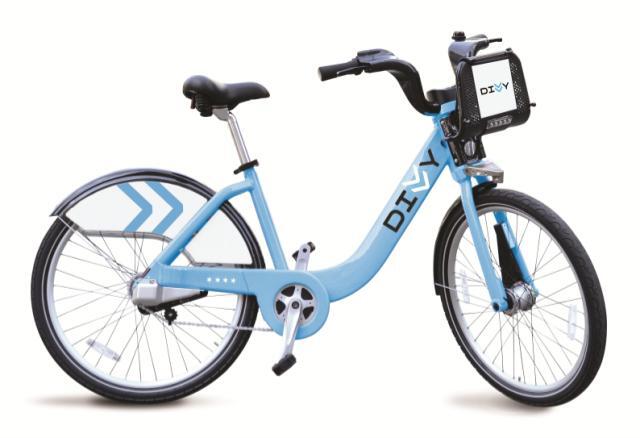Chicago bike sharing will be known as Divvy, be Chicago flag blue
Replies to This Discussion
-
Permalink Reply by in it to win it 8.0 mi on May 8, 2013 at 9:39am
-
No helmets available at time of rental or around rental locations.
That must mean that the city supports riding without a helmet.
Who is going to carry their helmet around all the time just in case they find the need for a Divvy?
-
Permalink Reply by Bevin on May 8, 2013 at 9:44am
-
This has always struck me as an issue with bike sharing. When I raised this in another forum, I got some vehement responses to my question. I could see keeping one at my office for the "just in case" use. But I certainly won't be carrying one around when I am out and about on weekends, etc. Tourists won't likely have them. I can't figure out an easy solution (other than those inflatable helmets?) but I hope someone creative will come up with a great, enterprising solution. Maybe downtown hotels could offer them to their guests?
-
Permalink Reply by Lisa Curcio on May 8, 2013 at 9:46am
-
Step 3 in "How it works" at divvy.com:
"Run an errand, grab a bite, commute to work or school. Don't forget your helmet and watch your ride time!"
(Emphasis added.)
-
Permalink Reply by Bevin on May 8, 2013 at 1:51pm
-
Glad they encourage helmets. But, that doesn't account for spur-of-the-moment trips and tourists, so agree that the program assumes there will be riders without helmets.
-
Permalink Reply by Thunder Snow on May 9, 2013 at 2:48am
-
Permalink Reply by Christine (5.0) on May 9, 2013 at 3:02am
-
I think most users aren't going to wear helmets. Does anybody know what it is like in the other American cities where this is popular? I certainly didn't wear a helmet the times I've used a system like this while abroad.
Which means, eventually, someone is going to get seriously hurt while using Divvy. And as tragic as that inevitability is, I'm already curious about how that will be handled. When cyclists get injured, because of our not-very-stellar reputation among non-cyclists, people don't really care that much. But the Divvy martyr will not be a regular cyclist, and they could be an old man, or a pregnant woman, or some other demographic that generally garners more sympathy. It could be that harsher restrictions for cyclists are introduced, to "protect" us. I'm hoping that instead there will be a public outcry for safer biking infrastructure.
-
Permalink Reply by Michelle S on May 9, 2013 at 3:49am
-
Most users won't use helmets. The safety record for bike share users elsewhere is better than riding one's own bike. (I don't feel like hunting for the link to this.) These bikes have fat tires, weigh 40 lbs and most people won't be riding them faster than 12 mph. I believe that riding predictably, following signals, using hand signals to indicate intended movement, and remaining visible (day and night) are much more important and effective ways to reduce the risk of crash and injury. Hopefully Divvy will provide information to new users on all those issues. Bike share systems are only successful where people feel comfortable using the bikes without wearing helmets (whether due to law or culture). Any person or agency that reinforces the "helmets are the most important way to stay safe!" rhetoric is discouraging the use of bike share.
-
Permalink Reply by Adam Herstein on May 9, 2013 at 3:59am
-
Michelle Stenzel said:
remaining visible (day and night)
+1 for built-in hub-dynamo lights!
-
Permalink Reply by Thunder Snow on May 9, 2013 at 4:03am
-
http://www.nytimes.com/2012/09/30/sunday-review/to-encourage-biking...
Bike share and helmets don't really work together. It may be a devil's bargain, but that's reality, until someone designs a $2 disposable helmet that can be dispensed on site, or a cheap inflatable or folding helmet that can be carried.
-
Permalink Reply by Duppie on May 9, 2013 at 4:08am
-
I see a new business opportunity for BalloonBiker. Is she still in Chicago?
Thunder Snow said:
-
Permalink Reply by Kevin C Dormant on May 9, 2013 at 5:06am
-
Jami's in Seattle.
Duppie 13.5185km said:I see a new business opportunity for BalloonBiker. Is she still in Chicago?
[snip]
-
Permalink Reply by Anne Alt on May 9, 2013 at 5:12am
-
This bike design is very stable. I think it would be almost impossible to do an endo on one of these bikes. Most people riding them are likely to be going about 8-12 mph, so risk of injuries in a crash is lower.
Michelle Stenzel said:Most users won't use helmets. The safety record for bike share users elsewhere is better than riding one's own bike. (I don't feel like hunting for the link to this.) These bikes have fat tires, weigh 40 lbs and most people won't be riding them faster than 12 mph. I believe that riding predictably, following signals, using hand signals to indicate intended movement, and remaining visible (day and night) are much more important and effective ways to reduce the risk of crash and injury. Hopefully Divvy will provide information to new users on all those issues. Bike share systems are only successful where people feel comfortable using the bikes without wearing helmets (whether due to law or culture). Any person or agency that reinforces the "helmets are the most important way to stay safe!" rhetoric is discouraging the use of bike share.
Groups
-
Chicagoland Beer Explora…
203 members
-
Wednesday Night for Mort…
1 member
-
Great Lakes Ultra Cycling
270 members
-
Major Taylor Internation…
1 member
-
Critical Mass discussion
261 members

.jpg?width=200)